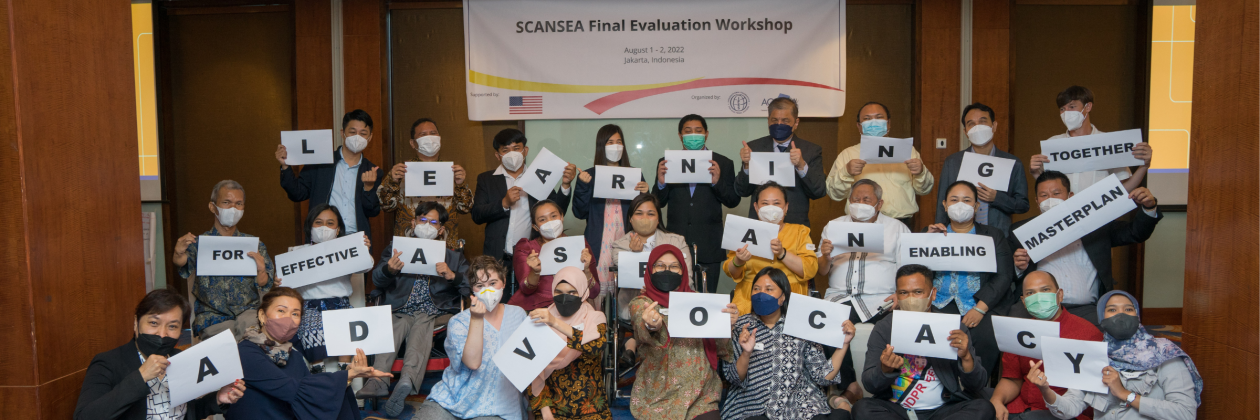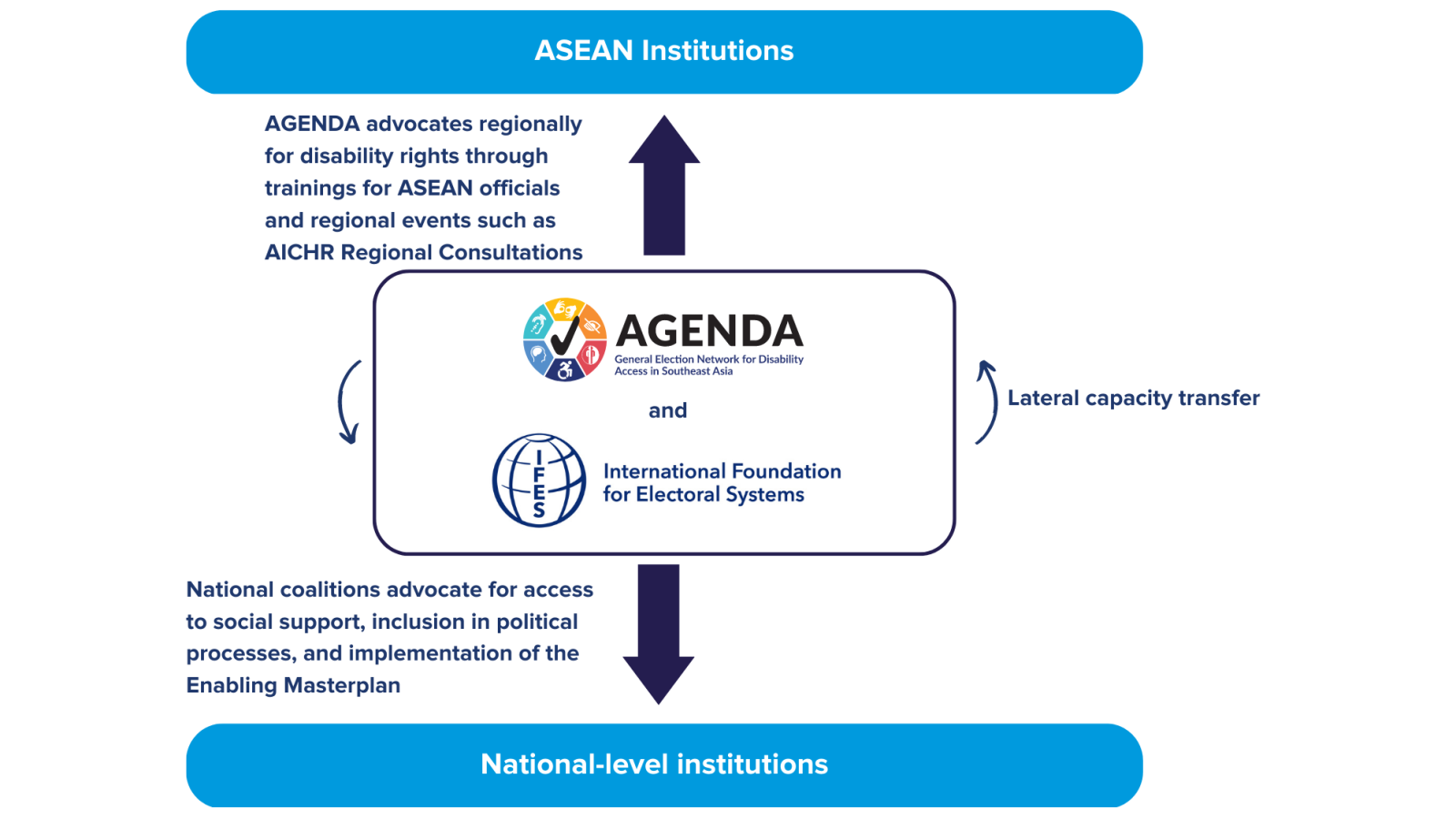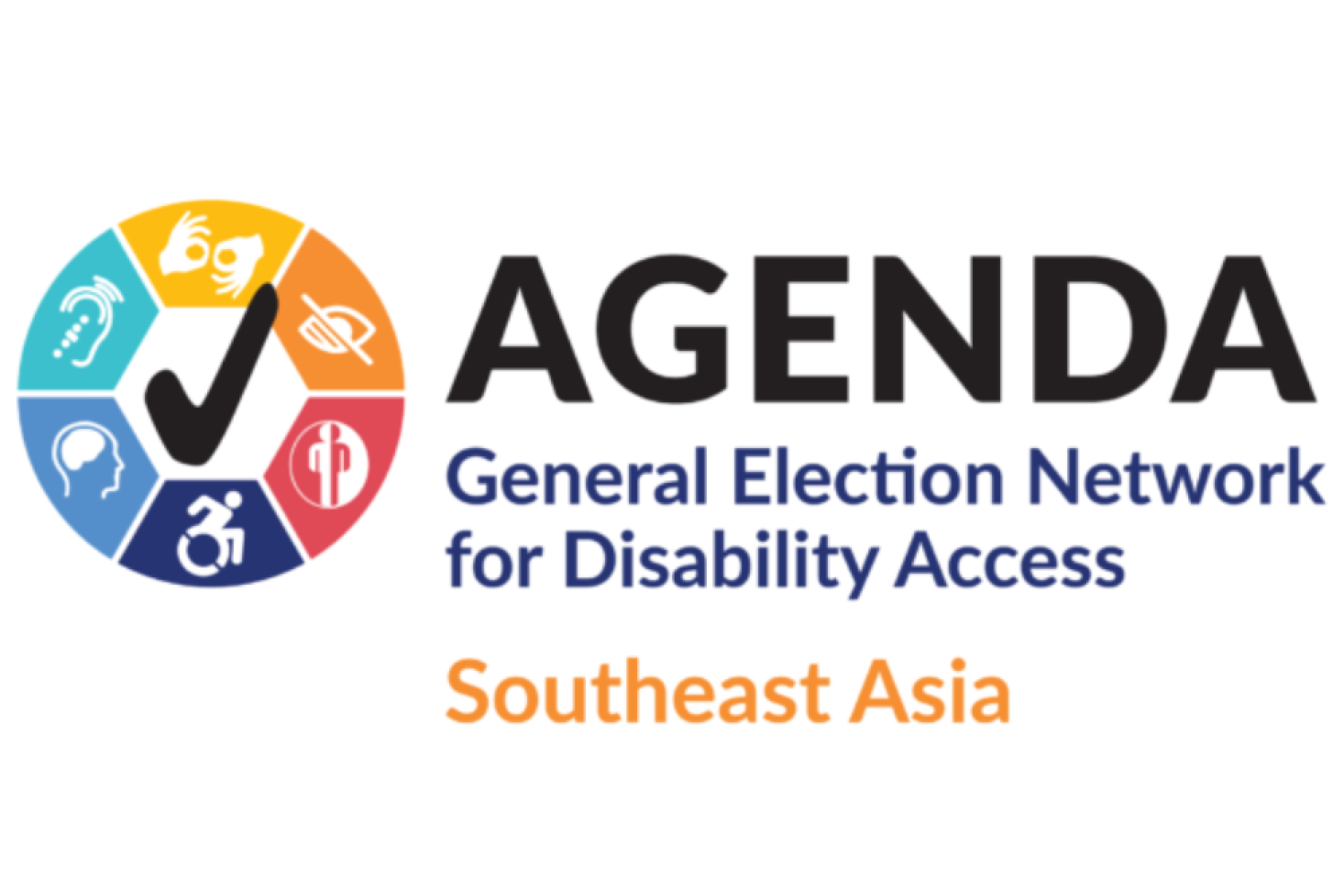
10 Years of Effective Disability Rights Advocacy in Southeast Asia
According to World Health Organization estimates, Southeast Asia is home to about 95 million people with disabilities, who face many barriers in their daily lives, including while exercising one of their most fundamental rights—the right to engage in political life. In 2011, the International Foundation for Electoral Systems (IFES) established the General Election Network for Disability Access (AGENDA) as a forum to improve access of people with disabilities in Southeast Asia to political and electoral opportunities through increased public awareness and advocacy for change. Since its inception, AGENDA has fostered strong relationships with the Association of Southeast Asian Nations (ASEAN) Bodies, including the ASEAN Intergovernmental Commission on Human Rights (AICHR), to promote the development of a regional human rights instrument to support the inclusion of persons with disabilities rights across the region.
Over the past 10 years, AGENDA’s initiatives have supported gender equality, women’s rights, and youth engagement as critical elements of disability rights advocacy. These efforts aimed to promote the creation of inclusive enabling environments where all persons with disabilities can exercise their human rights and participate meaningfully in the social and political fabric of each country.
A Timeline of AGENDA
AGENDA—A Successful and Sustainable Creative Partnership
Prioritizing a “Thinking and Working Politically” approach through funding diversity
Many civil society organizations struggle with the temporality of donor-driven funding—short time spans, surface-level interventions, and ultimately the “othering” of local partners in their own countries. Further research by IFES after 25 years of programming has confirmed this but demonstrates that this cycle can be broken with improved planning, comprehensive mentorship, and a sustainable transfer of skills. This research aligns with a concerted drive by the international development community to “think and work politically (TWP),” effectively an effort to work adaptively within constantly changing contexts and to actively alter the context through continual context monitoring, learning, adapting, and influencing. While unable to entirely escape the projectization of development work with AGENDA, IFES has sought to fund AGENDA continually through diverse sources. Thus, IFES can continue working through a TWP lens by flexibly supporting local partners to advocate for increased inclusivity and rights. Funding comes from donors such as the United States Agency for International Development, the Australian Department of Foreign Affairs and Trade, and the United States Department of State Bureau for Democracy, Rights and Labor, leading to consistent, adaptable, and complementary funding over the past 11 years. As funding has diversified to move past the project cycle, IFES has also adapted AGENDA’s efforts to focus on rights-based priorities. This approach was not without challenges, as often the flexibility that came from diversification came with years of lower funding where efforts were focused more on fundraising for the future than current support to partners in terms of advocacy and technical assistance. Additionally, partners’ advocacy often focused on awareness raising and more “with-grain” efforts when the context called for it—especially in closing civic spaces. As the partnership continues, AGENDA organizations of persons with disabilities (OPDs) employ mixed advocacy tactics of working with and against the grain—leveraging lessons and skills learned from network partners to advocate on multiple levels for disability rights despite constantly changing donor priorities.
Shifting from thematic focus to regional advocacy and coalition building
IFES formed AGENDA to focus on the political inclusion of persons with disabilities; from its inception, AGENDA has pursued a mutually reinforcing strategy of advocating at the national and regional levels. The partnership recognized that political rights were a critical advocacy issue and success meant involving persons with disabilities in the policy-making process on every level—leading to opportunities for progress in other rights areas. AGENDA partners contributed to developing new tools for election commissions and civil society during this time, such as IFES’s Election Access Observation Toolkit, Disability Access and Inclusion in the Political Processes of Four Southeast Asian Countries report, and media guidelines for reporting on election access. AGENDA’s connections with civil society expanded knowledge of disability rights among other electoral stakeholders. Its intersectional and gender-sensitive approach to advocacy has ensured the inclusion of women, young people, and LGBTQI+ populations in all aspects of the program—both cross-sectoral and within its own activities.
The narrower topic of political rights of persons with disabilities gave the AGENDA network a significant right-sized start-up challenge. Organizations of persons with disabilities (OPDs) in the network gained experience building cross-sector civil society partnerships with thematically specialized election monitoring organizations and engaging with national duty-bearers, mainly election management bodies, on a limited but essential set of political inclusion issues. Through AGENDA's early work as an election network, OPDs gained significant research, advocacy, regional dialogue hosting skills, and an expanded network of valuable contacts in the political arena. This would all prove a critical precursor to the skills and approaches needed for the project’s second phase, which saw a rapid widening of AGENDA's focus from political inclusion to mainstreaming disability rights across ASEAN's entire regional development framework.
As AGENDA continued advocating for increased political rights in the electoral cycle, its advocacy grew to include cohesive advocacy with ASEAN institutions. For political rights, ASEAN's new human rights body, the Intergovernmental Commission on Human Rights (AICHR), was a critical potential champion of political inclusion. AICHR provided a positive spillover effect on other rights, given its position as part of the political security pillar, but with an overarching mandate that extended into the regional association's economic, social, and cultural concerns. The 10 ASEAN Member States’ ratification of the UN Convention on the Rights of Persons with Disabilities (CRPD) also presented a unique alignment of incentives; AICHR saw a consensus-paved path forward on a human rights issue set—rare for a region of such diverse governance models—and disability rights advocates saw a new institutional ally. AGENDA’s advocacy and cooperation with AICHR resulted in the drafting and creation of the ASEAN Enabling Masterplan 2025: Mainstreaming the Rights of Persons with Disabilities (Enabling Masterplan), which shifted AGENDA’s advocacy focus from political rights to disability rights on national and regional levels. Partners continue to advocate nationally while participating in workshops and meetings with high-level political representatives within various ASEAN institutions to bring national perspectives to the forefront of the decision-making process. This has led to unprecedented collaboration between disability rights advocates and national and regional governments to realize their shared goal of ensuring persons with disabilities’ access to and exercise of their political, social, and economic rights.
Currently, AGENDA, in collaboration with the Poverty Eradication and Gender Division (PEGD) of the ASEAN Secretariat and the Senior Officials Meeting on Social Welfare and Development (SOMSWD), is working with ASEAN Sectoral Bodies to design and implement the ASEAN Enabling Masterplan Monitoring and Evaluation Resources: Guidelines for the ASEAN Sectoral Ministerial Bodies for the midterm review. A stock-taking exercise will be conducted to develop an inventory of projects and initiatives aligned with the values and rights stipulated by the Enabling Masterplan action points. The ASEAN Secretariat and SOMSWD, with support from the UN Economic and Social Commission for Asia and the Pacific, developed a monitoring and evaluation framework in 2021 to measure the impact of the Enabling Masterplan from 2018-21. AGENDA continues to be instrumental in helping ASEAN to operationalize the framework, supporting capacity building training initiatives to collect and analyze disability-inclusive data while encouraging active participation of OPDs in this feedback process. The monitoring and evaluation of the Enabling Masterplan creates a wealth of data that can then be used to maximize impact under the current masterplan and to strengthen ASEAN’s ability to amplify current efforts to design the next 10-year ASEAN Community Blueprint that will be developed over the same period.
Promoting a sustainable capacity bridging approach for local partners
IFES designed AGENDA to be a network of organizations of persons with disabilities (OPDs) and civil society organizations from Southeast Asia. By design, the forum focuses on capacity transfer between partners—all who came to the network with varied issue expertise. Support began from AGENDA’s start in 2011 when it was clear that many civil society organizations (CSOs) and OPDs were new to grassroots political advocacy approaches, while others were new to disability advocacy approaches. IFES worked with partners to integrate inclusion approaches to existing electoral advocacy and to build organizations’ knowledge in communication skills, financial management, coalition building, English language skills, computer skills, and learning more about disability issues in the Southeast Asia region. AGENDA gained political advocacy expertise from IFES and worked together to co-develop new tools and approaches, which generated learning that informs IFES’s global political inclusion work. As AGENDA strengthened its regional advocacy efforts, the process increased the confidence of OPD partners to collaborate with government stakeholders such as electoral management bodies, election management bodies, and later with CSOs and ASEAN Sectoral Bodies. IFES also used this opportunity to build partners’ skills on policy platforms related to implementing the Enabling Masterplan. IFES continues to provide developmental support to regional partners through AGENDA, including inclusive digital advocacy for LGBTQI+ allyship and advanced advocacy skills. Ultimately, AGENDA support has led to high-level policy change, acknowledgment from government ministry officials, and the promotion of locally-led efforts to ensure disability rights are contextualized to the needs and priorities of persons with disabilities in each ASEAN country.
COVID-19 response
The COVID-19 pandemic produced challenges for all, especially for persons with disabilities, as they face additional barriers in crisis response and, now, in crisis recovery. Following the onset of the pandemic, AGENDA partners moved into an emergency learning phase, drawing response insights from peers in the network through regular virtual gatherings. This intra-network capacity bridging has carried on past the immediate emergency and has broadened to capacity needs beyond the COVID-19 response. Beyond intra-network support, AGENDA resumed activities virtually, and the flexibility of online trainings and workshops allowed AGENDA to coordinate with regional organizations and share lessons learned on their programs. AGENDA partners continue to promote vigilance about COVID-19 and advocate for disability-inclusive responses to its effects. The Enabling Masterplan’s principles and action areas gain even more urgency as something that should be mainstreamed into ASEAN’s pandemic response and recovery, alongside connecting to its regional development plans.
Towards the future
Over the last 10 years, AGENDA has grown in content and reach. Through the dedication of AGENDA OPD partners, advocacy efforts now cover critical areas of policy reform and decision-making outside of direct participation in elections. Each partner contributes to peer-to-peer learning opportunities and region-wide initiatives as a creative partnership. As such, the strength of AGENDA is in its partnerships both among OPDs and with regional bodies such as the ASEAN Secretariat, SOMSWD, and AICHR. As the creative collaboration continues to support disability rights in Southeast Asia, partners are reaching out to new CSOs, building coalitions that promote the implementation of the Enabling Masterplan for all persons with disabilities.

















